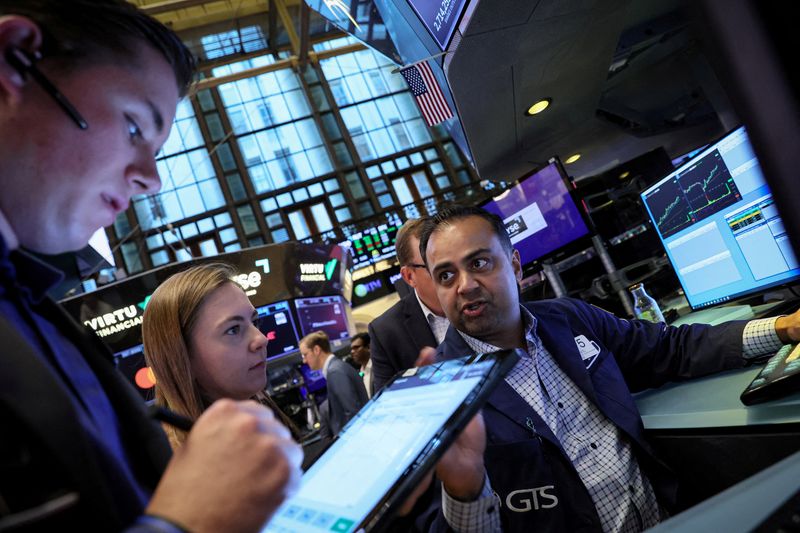Can anything shut down the Gold rally?
Investing.com -- US stock futures hovered around both sides of the flatline on Wednesday after a disappointing earnings report from European chipmaker ASML (AS:ASML) dragged down other semiconductor shares in the previous session. ASML lowered its guidance for its 2025 fiscal year, exacerbating concerns over the outlook for a chip industry that has been bolstered in recent months by soaring enthusiasm around artificial intelligence. Elsewhere, tech mogul Elon Musk gave around $75 million in three months to boost Donald Trump's bid to win a second four-year term as US president, new federal disclosures showed.
1. Futures mixed
US stock futures were mixed on Wednesday following a slip in equities on Wall Street in the prior session due in part to weakness in chipmaking names.
By 03:32 ET (07:32 GMT), the Dow futures had fallen by 56 points or 0.1%, S&P 500 futures had dipped by 4 points or 0.1%, and Nasdaq 100 futures had edged up by 13 points or 0.1%.
All three of the main indices retreated on Tuesday, weighed down by a dip in semiconductor stocks after a disappointing earnings report and financial outlook from Netherlands-based group ASML (see below). Energy firms were also lower, mirroring a drop in oil prices stemming from easing fears over supply disruptions out of the Middle East.
The benchmark S&P 500 and 30-stock Dow Jones Industrial Average both slumped by 0.8%, stepping back from record highs notched earlier in the week. The tech-heavy Nasdaq Composite, meanwhile, shed 1.0%.
2. ASML's early earnings dent global chipmakers
ASML (NASDAQ:ASML) slashed its guidance for next year and reported third-quarter orders that were almost half of what analysts had projected, sending its US-listed shares down by more than 16% on Tuesday.
Europe's most valuable tech company said it now expects total net sales to between 30 billion euros to 35 billion euros in 2025, with gross margins between 51% and 53%. Its prior estimates had seen revenues as high as 40 billion euros and gross margins of 54% to 56%.
Net bookings, which help gauge orders, came in at 2.6 billion in the third quarter, well under analysts' forecasts of over 5 billion euros.
The underwhelming results, which were published a day earlier than expected because of a "technical error", were viewed as a "large red flag for tech more broadly", according to analysts at Vital Knowledge.
Tech stocks slumped following ASML's release, including shares in chipmakers like artificial intelligence-darling Nvidia (NASDAQ:NVDA) and UK chip designer Arm (NASDAQ:ARM). Semiconductor firms in Asia and Europe also dropped.
3. Musk gave $75 million to support Trump's presidential campaign
Elon Musk gave roughly $75 million in the span of three months to help Donald Trump win the upcoming US presidential election, underscoring the importance of the world's richest man to the Republican candidate's campaign.
Musk, the tech tycoon behind electric vehicle giant Tesla (NASDAQ:TSLA) and social media platform X, made several multi-million dollar donations to his pro-Trump America PAC spending group between July and September, according to disclosures filed with the Federal Election Commission.
America PAC has hired people to encourage voter turnout in Pennsylvania and Michigan -- key swing states that could impact the outcome of the Nov. 5 ballot. Because the Trump campaign is mostly reliant on outside groups to canvass voters, Musk's expenditures may give him a more outsized role in deciding the election, Reuters has reported.
National polls have shown that Trump's Democratic rival Kamala Harris holds a narrow lead over the former president, although the two are virtually tied across several battleground states.
4. LVMH sales dip
Shares in luxury giant LVMH (EPA:LVMH) slumped on Wednesday after the Louis Vuitton owner posted a surprise drop in third-quarter sales and flagged an "uncertain" trading environment.
The Paris-based group, which is often seen as a marker for the rest of the high-end goods industry, reported a 3% decrease in revenues to 19.1 billion euros in the three months ended on Sept. 30 versus the year-ago period.
Analysts had anticipated organic growth of 2%, according to Barclays.
Sales in Asia excluding Japan declined by 16% in particular, fueling fears over weak consumer spending in the crucial Chinese luxury market. In a call with analysts, Chief Financial Officer Jean-Jacques Guiony said the company still believed in the future of its Chinese operations, but added that consumer confidence in the country had slid to the all-time lows of the COVID-19 era.
LVMH peers like Kering (EPA:PRTP), Hermes (EPA:HRMS) and Burberry (LON:BRBY) were all lower in early European trade following the report.
5. Oil steadies
Oil prices steadied Wednesday after recent sharp losses, as traders assessed signs of possibly cooling tensions in the Middle East and concerns over a slowdown in demand growth from top exporter China.
By 03:31 ET, the Brent contract climbed 0.7% to $74.78 per barrel, while U.S. crude futures (WTI) traded 0.8% higher at $71.16 per barrel.
Both benchmarks plummeted more than 4% in the prior session to a near two-week low after a media report said Israel will not attack Iran’s oil and nuclear facilities, quelling fears of a major escalation in the Middle East.
Weak economic readings from China also weighed, while both the Organization of the Petroleum Exporting Countries and the International Energy Agency cut their demand growth outlooks for 2024 this week.
